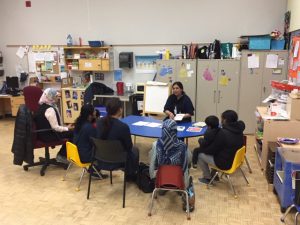How one Whitby program is harnessing the power of community partners
 All parents have questions about child health and development, but language and other barriers can make it difficult for many newcomer parents to get answers. Parents often turn to CNC staff for help, so when Cathy Condarcuri-Sain, Supervisor of Language Programs at the Durham Catholic District School Board Whitby Language Center’s CNC program, heard that the YMCA’s Family and Community Action Program (FCAP) offered workshops on these topics for parents, she took notice.
All parents have questions about child health and development, but language and other barriers can make it difficult for many newcomer parents to get answers. Parents often turn to CNC staff for help, so when Cathy Condarcuri-Sain, Supervisor of Language Programs at the Durham Catholic District School Board Whitby Language Center’s CNC program, heard that the YMCA’s Family and Community Action Program (FCAP) offered workshops on these topics for parents, she took notice.
Cathy’s program regularly promoted the FCAP evening and weekend sessions to parents, but they were never local to Whitby—making them challenging for local newcomer families to get to. “I wondered…” she recalls, “how can I bring this learning into our CNC program?”
Whitby Language Center brought the experts on-site.
Cathy approached both FCAP (which is funded by the Public Health Agency of Canada) and Durham Region Public Health. As it turns out, Public Health tracks populations, and the CNC program is in a pocket where children are at a higher risk of failing to meet developmental milestones. They were happy to connect with newcomer parents in the area and introducing lunch and learn sessions seemed like a great opportunity for all involved.
Not only were parents available and already on-site, but Cathy had noticed that, while they ate lunch with their children every day in the CNC room, they generally spoke their home languages. Lunch and learn sessions were an opportunity to not only deliver important parenting information, but also a chance for parents to practise their English.
The lunch and learns are tailor-made for the families the CNC program serves.
It has been a resounding success so far, and the program is still going strong. For the past two years, every Tuesday, parents participate in 30-minute lunchtime sessions. The speakers cover a variety of subjects that are highly relevant to families. That’s because, for topic ideas, they look no further than the program.
Staff collect questions that come up in conversation with parents. They also identify areas where professional advice could benefit the entire group or even just one family. For instance, if staff notice a child keeps coming in late and the parent says they’ve been having trouble getting them to fall asleep, or if they notice a child coming in eating a chocolate bar every morning, staff make note of it for future lunch and learn discussions.
Despite the frequency of the sessions, Cathy maintains that there’s no shortage of ideas. “They have covered every topic imaginable–from the new food guide, breastfeeding, booster seats, and toilet training to bedtime routines, screen time, immunization and getting ready for kindergarten.”
Every few months, Cathy plans the timetable with the facilitators. She posts the schedule for the next two months inside and outside the child care room. The day before a session, she places a whiteboard outside the room with the next topic listed. This allows interested parents who have children enrolled in half-day morning or afternoon sessions to arrange to come early or stay late.
There are some open weeks where participants can ask any questions. Other times, they have a special speaker. For example, a facilitator from Durham Region Dental Health recently spoke about oral hygiene. She also made families aware of the local clinic that provides free dental health checks for children—a service that is often used by newcomers in the area.
Community partners are often ready and willing to help.
“It’s all about making connections with community members and finding the right organization to work with–whether it be a health department or an early years program,” says Cathy. “It became a collaborative effort with agencies that are not related to each other. Typically, a facilitator from FCAP presents three times per month on child development issues, while a public health nurse who specializes in child development conducts the remaining week’s session.”
What’s more, according to Cathy, the program is easy to manage. The presenters do the bulk of the work, with a little guidance from staff. For example, comprehension can be an issue, as students speak different languages and levels of English. As well, because parents are feeding their children during the presentation, they may miss some of the content. Cathy encourages the presenters to speak slowly, to be interactive and to use visuals. To that end, she places a portable whiteboard in the room for facilitators to write things down. And, whenever possible, take-home information is available so participants can use Google translate or have someone translate it for them.
It’s an easy way to make a lasting difference.
Not only are families happy to have access to health and parenting information through the lunch and learn sessions, staff are pleased to have the additional support.
“The staff, both of whom are ECEs, share their wealth of knowledge. Then, we have health professionals coming in repeating the same messages.” notes Cathy. “That is the key—it is not just another mother offering advice.” And, while it hasn’t happened overnight, program staff have noticed changes in parenting practices.
Between the easy access to experts and the tailored advice, it’s already win-win, but there’s one more big advantage for the newcomer families who take part. “Parents are not embarrassed or afraid to ask questions,” says Cathy, of those who gather over lunch to learn, to practise their English and to hone their parenting skills. “Everyone is in the same situation.”






